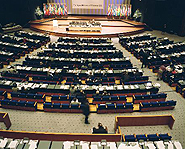Editorial
The Kampala Conference: the review of the Statute of the International Criminal Court
The Review Conference of the Statute of the International Criminal Court was convened by the UN Secretary-General on 7 August 2009, in accordance with the stipulations of article 121 of the Statute, and will be held in Kampala (Uganda) between 31 May and 11 June. The Statute was adopted at the diplomatic conference held in Rome in June and July 1998 and came into force on 1 July 2002, after being ratified by 60 States. After the recent ratification by Bangladesh, there are 111 States Parties to the Statute.

The Kampala Conference will take place at a time when the Court has begun the first trials relating to the situation in the Democratic Republic of the Congo: the case of Thomas Lubanga Dyilo, founder of the Union of Congolese Patriots (UPC) and the Patriotic Forces for the Liberation of Congo (FPLC), who is accused of the war crime of forcible conscription of child soldiers; and those of Germain Katanga, ex-commander-in-chief of the "Patriotic Resistance Force in Ituri" (FRPI), and Mathieu Ngudjolo Chui, an Army colonel and former commander of the militia of the National Integrationist Front (FNI) and the Patriotic Resistance Force in Ituri (FRPI), accused on various charges of crimes against humanity (murder, rape and sexual slavery of women) and war crimes (apart from the above, forcible conscription of child soldiers to participate actively in hostilities, attacks against the civil population and looting).
The choice of Uganda is no coincidence. It was not only one of the first African States to ratify the Statute, but was also the first State (on 29 January 2004) that asked the Court's Prosecutor to investigate a situation - that of Uganda itself – in which crimes which were within the Court's competence appeared to have been committed. The choice of an African country is also an attempt to respond to the harsh criticism that it has received from the continent, centered on a perceived bias against Africa at the International Criminal Court. Indeed, the five investigations opened to date by the Court affect African countries (Democratic Republic of the Congo, Uganda, Central African Republic, Sudan and Kenya). However, the Prosecutor is also closely monitoring the situation in other countries: Afghanistan, Colombia, Côte d'Ivoire, Georgia and Palestine.